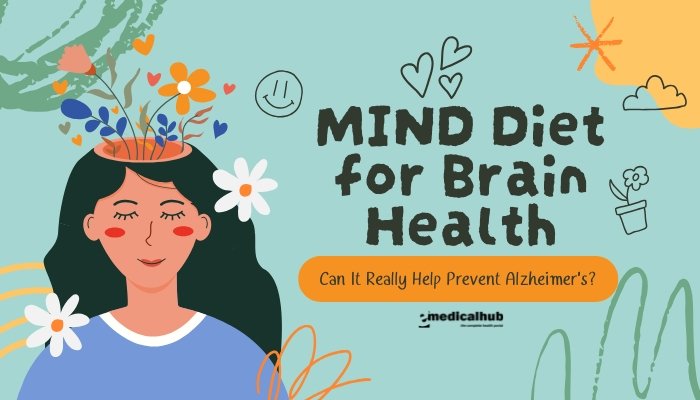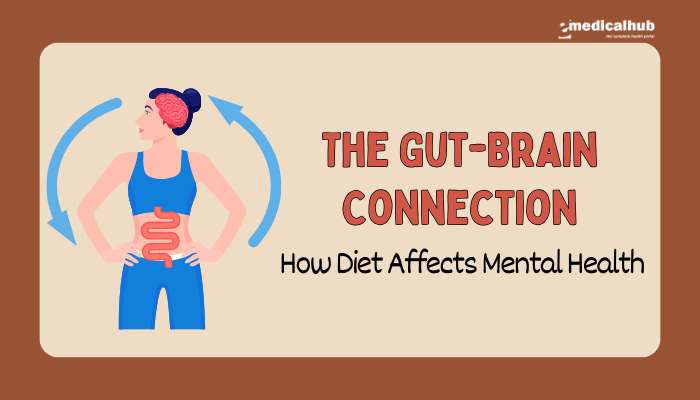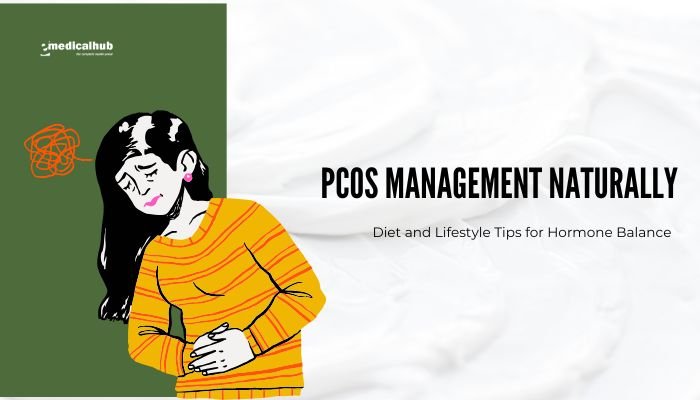Introduction
With Alzheimer’s disease and other forms of dementia on the rise globally, people are increasingly looking to science-backed dietary approaches to keep their brains sharp. One promising regimen is the MIND diet—an eating pattern that combines elements of the Mediterranean and DASH diets, specifically aimed at bolstering cognitive health.
Early studies suggest this approach may reduce the risk or slow the progression of Alzheimer’s disease, sparking significant interest among the medical community and the public alike.
But how exactly might spinach, berries, nuts, and whole grains safeguard memory? What does the MIND diet look like day-to-day? And does the research live up to the hype? This article explores the rationale behind the MIND diet, reviews current evidence on its neuroprotective potential, and offers practical tips for embracing its guidelines.
If your goal is to preserve clear thinking and potentially stave off age-related cognitive decline, the MIND diet’s emphasis on brain-friendly nutrients may be worth considering.
Disclaimer: This information is intended for general educational purposes only and does not replace personalized medical advice. If you have specific questions about cognitive health or dietary changes, consult a qualified healthcare professional.

Understanding the MIND Diet
The Acronym: MIND
MIND stands for Mediterranean-DASH Intervention for Neurodegenerative Delay. It merges features of:
- Mediterranean Diet: Rich in fruits, vegetables, legumes, olive oil, fish, and moderate wine intake.
- DASH Diet: Emphasizes low sodium, high potassium, and whole grains for blood pressure control.
The MIND diet specifically zeroes in on foods tied to better brain health, with an aim to slow neurological aging.
Core Principles
MIND sets specific guidelines about which foods to prioritize vs. limit:
10 Brain-Healthy Foods:
- Green leafy vegetables (e.g., spinach, kale) – aim for six or more servings/week.
- Other vegetables – at least once/day.
- Berries (especially blueberries) – at least two servings/week.
- Whole grains – at least three servings/day.
- Fish – at least once/week.
- Poultry – at least twice/week.
- Beans/legumes – at least three servings/week.
- Nuts – around five servings/week.
- Olive oil – the primary cooking fat.
- Wine (optional) – up to one glass/day if appropriate.
5 Foods to Limit:
- Butter/margarine – <1 tablespoon/day.
- Cheese – <1 serving/day.
- Red meat – fewer than four servings/week.
- Fried or fast food – <1 serving/week.
- Pastries/sweets – limited, choosing fruit or other healthier treats.
Why Might It Help Prevent Alzheimer’s?
Anti-Inflammatory and Antioxidant Effects
Alzheimer’s disease and other dementias often involve oxidative stress and chronic low-grade inflammation in the brain:
- Fruits, Vegetables, Berries: High in antioxidants (vitamin C, polyphenols) neutralize free radicals.
- Olive Oil, Nuts: Provide monounsaturated fats and anti-inflammatory compounds.
- Fish: Supplies omega-3 fatty acids (DHA) known to support neuronal membrane health and reduce inflammation.
Healthy Vascular Function
Cerebral blood flow is key to delivering oxygen and nutrients. The MIND diet’s emphasis on whole grains, minimal sodium, and beneficial fats helps maintain vascular integrity, reducing the risk of small vessel disease that can contribute to cognitive decline.
Potential Protection of Brain Structure
Some studies suggest that key nutrients in the MIND diet might help preserve hippocampal volume or delay brain tissue atrophy. For instance:
- Vitamin E from nuts, seeds, and spinach can protect neuronal membranes from oxidative damage.
- Folate from leafy greens might reduce homocysteine, a potential risk factor for dementia.
Blood Sugar Regulation
By limiting refined carbs and sugary foods, the MIND diet helps keep blood glucose stable. High blood sugar and insulin resistance have been implicated in increased Alzheimer’s risk, sometimes labeled as “type 3 diabetes.” A stable glycemic pattern might defend against cognitive impairment.
Evidence and Studies
Observational Findings
The pioneering study by nutrition epidemiologist Martha Clare Morris and colleagues found that older adults who followed the MIND diet had 53% lower risk of Alzheimer’s when closely adhering to the guidelines, and 35% lower risk even with moderate adherence. Additional population-based research supports correlations between MIND diet adherence and slower cognitive decline.
Mechanistic Trials
While large-scale randomized controlled trials are fewer, smaller interventions suggest improvements in memory tasks, or reduced inflammation markers, with MIND-like diets. More robust, longer-term trials are still ongoing, aiming to confirm causality vs. correlation.
Comparison with Mediterranean or DASH Diets
Studies often find the MIND approach overlaps heavily with Mediterranean or DASH, but with a heightened emphasis on certain brain-boosting foods (berries, leafy greens). Many results are comparable—both diets appear protective for cognition and cardiovascular health. MIND was formulated specifically with neuroprotection in mind, whereas the Mediterranean and DASH diets focus more broadly on heart and metabolic outcomes.
Practical Guidelines: How to Follow the MIND Diet
Daily / Weekly Targets
Daily:
- At least 3 servings of whole grains
- 1 salad or 1 serving of leafy greens
- 1 other vegetable
- Use olive oil as primary fat
Weekly:
- Beans or legumes at least 3x/week
- Fish at least 1x/week, poultry 2x/week
- Berries at least 2x/week
- Nuts (handful) most days if possible
Limit or Restrict:
- Butter/margarine to <1 tablespoon/day
- Cheese, fried/fast foods, sweets/pastries—occasional to minimal
Food Examples
- Green Leafy Veggies: Spinach, kale, collard greens, Swiss chard.
- Berries: Blueberries, strawberries, raspberries.
- Whole Grains: Oats, brown rice, 100% whole wheat bread, quinoa.
- Legumes: Lentils, black beans, chickpeas.
- Nuts: Almonds, walnuts, pistachios, hazelnuts.
- Fish: Salmon, sardines, cod, or shellfish.
- Poultry: Chicken breast, turkey.
- Olive Oil: For sautéing or dressings, rather than butter.
Moderation of Wine
If you already drink alcohol, the MIND diet suggests up to 1 glass/day of wine—particularly red. Those who don’t drink alcohol are not encouraged to start; the potential benefits must be balanced against personal health risks.
Tips for Making It Sustainable
Gradual Incorporation
If your current diet is quite different, ease in:
- Swap refined grains (white bread/pasta) for whole-grain versions
- Add an extra serving of vegetables daily
- Replace butter with olive oil in cooking
- Include a fish meal each week
Meal Planning
- Breakfast: Oatmeal with berries and nuts, or whole-grain toast, avocado, eggs (occasionally)
- Lunch: Leafy green salad with beans, nuts, drizzle of olive oil, side of whole-grain crackers.
- Dinner: Grilled chicken or salmon, with sautéed spinach or broccoli, and brown rice/quinoa.
- Snacks: Carrot sticks with hummus, a handful of walnuts, or a piece of fruit.
Emphasize Freshness and Flavor
Herbs, garlic, onion, and lemon juice can make vegetables and whole grains tasty without excessive sodium. Experiment with Mediterranean-inspired or creative cooking styles.
Overcoming Cost or Accessibility Issues
- Bulk-buy beans, brown rice, or oats for cost-effectiveness.
- Frozen berries or vegetables are cheaper and still nutritious.
- Compare prices for different fish or use canned fish (like tuna or sardines) as a budget-friendly alternative.
Who Can Benefit Most?
Middle-Aged and Older Adults
Starting MIND dietary patterns in midlife may help preserve cognitive function. Even adopting it later can provide measurable advantage for older individuals at risk of memory decline.
Those with Family History of Dementia
If you have close relatives with Alzheimer’s, adopting MIND guidelines could be a preventative measure—though no guarantee. Lifestyle still strongly influences disease onset, even with genetic predispositions.
Others with Cardio-Metabolic Concerns
MIND also parallels aspects of the Mediterranean or DASH diets, beneficial for hypertension, type 2 diabetes, obesity, or elevated cholesterol. The synergy can help both heart and brain simultaneously.
Frequently Asked Questions (FAQ)
Do I have to eat fish if I’m vegetarian or vegan?
MIND guidelines are flexible. You can replace fish’s healthy fats with algae-based omega-3 supplements or prioritize nuts/seeds. The focus is on nutrient density and limiting harmful foods, so a well-planned vegetarian version can work.
Is it okay to have a small dessert daily?
The MIND diet aims to limit sweets, but an occasional small treat can be incorporated if the rest of your intake aligns well. Everything in moderation—just not multiple desserts daily.
Will I lose weight on the MIND diet?
Possibly. Many people find it fosters a moderate calorie intake, high satiety from fiber and protein. Weight management can be a side benefit, though focusing on portion control and daily activity remains crucial for weight loss.
Is the MIND diet for a certain duration only?
Generally designed as a long-term lifestyle, not a short fix. The cognitive and cardiovascular benefits accumulate over time with consistent adherence.
How soon might I notice improvements in mental clarity?
Changes in overall well-being (like better energy, stable mood) can arise within weeks or a few months. For significantly measurable impacts on cognitive aging or risk reduction, it’s a more gradual process, often years.
Conclusion
The MIND diet stands out as a carefully crafted hybrid of the Mediterranean and DASH diets, specifically oriented toward cognitive protection. By emphasizing leafy greens, berries, whole grains, fish, legumes, nuts, and olive oil—and by limiting sugary treats, red meat, and saturated fats—it weaves together nutritional elements shown to benefit both the heart and the brain. While no single diet fully guarantees the prevention of Alzheimer’s or other dementias, accumulating evidence suggests the MIND diet can help reduce risk and potentially slow cognitive decline.
Implementing the MIND approach doesn’t require drastic steps. Simple, consistent shifts—like adding a daily green salad, snacking on berries, substituting olive oil for butter, and incorporating fish once a week—can align your meals with MIND guidelines. Over months and years, these habits, combined with physical activity, social engagement, and intellectual stimulation, might add up to a real difference in mental function and overall longevity. For anyone seeking a proven dietary model for healthy aging, the MIND diet offers a practical, tasty, and research-backed framework.
References
- Morris MC, Tangney CC, Wang Y, et al. MIND diet associated with reduced incidence of Alzheimer’s disease. Alzheimers Dement. 2015;11(9):1007-1014.
- Barnes LL, et al. Development and validation of a brief MIND diet screener. Nutrients. 2021;13(12):4482.
- Morris MC, et al. MIND diet for the prevention of cognitive decline. JAMA Neurol. 2017;74(10):1148-1155.
- U.S. News & World Report. MIND Diet Rankings. 2023.
- Kesse-Guyot E, Fezeu L, Andreeva V, et al. Adherence to Mediterranean diet. BMJ. 2019;364:l310.
- Estruch R, Ros E, Salas-Salvadó J, et al. Primary prevention of cardiovascular disease with a Mediterranean diet. N Engl J Med. 2013;368(14):1279-90.
- Chef M, et al. Berries intake in brain aging. J Alzheimers Dis. 2020;74(3):819-829.
- Palacios OM, et al. Whole grains and cognitive health. Adv Nutr. 2021;12(6):2323S-2329S.
- Neelakantan N, et al. Impact of fish consumption on cognition. PLoS Med. 2017;14(7):e1002389.
- Vandana J, et al. Tertiary HPC scoping review on MIND diet. J Nutr Sci. 2020;9(e41).
- USDA. Dietary Guidelines for Americans 2020-2025.
- WHO. Strategies to promote healthy ageing. 2022.





